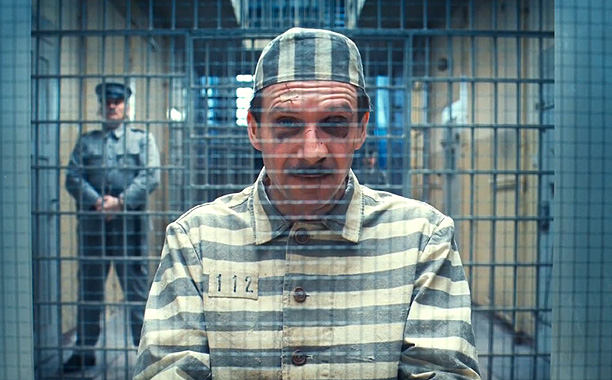
The Grand Budapest Hotel
Every Wes Anderson (Moonrise Kingdom) film takes place in its own world. His stories seem conjured from the daydreams of a precocious child with a taste for retro young-adult fiction and his kitschy production design sometimes make it seem as if his characters are wind-up dolls trapped in an intricate diorama. He embraces the artificiality of film, using it to create fictional universes too perfectly ordered to be real and too wondrous to ever want to leave.
Anderson’s films may be artificial, but they’re not unreal. His movies may be meticulously crafted postmodern exercises on the surface, but just below lie oceans of sincere emotion. A Wes Anderson film is defined just as much by its unspoken sadness and all-too-brief moments of human connection as it is by tweed and 1960s English pop music.
The Grand Budapest Hotel, by that logic, is Anderson’s most ersatz and most genuine movie. A matryoshka doll of increasingly fantastical stories within stories – it begins with a young woman reading a novel in a park before telling us the story of how the author came to hear the story of the novel and then the story of the novel itself – it is also the first Anderson film to engage with real history. To him, fantasy is a window to reality.
As with Ernst Lubitsch’s To Be or Not to Be and Charlie Chaplin’s The Great Dictator, The Grand Budapest Hotel is a thinly veiled satire of the Nazi rise to power. Although it takes place in the fictional nation of Zubrowka and the word “Nazi” is never spoken, it’s never anything less than clear what the film is dealing with. It is both comic and tragic, turning its fascist villains into brutal buffoons who are at once mockable and monstrous.
At the nucleus of the sprawling cast is M. Gustave (Ralph Fiennes, The Invisible Woman), the titular hotel’s devoted concierge. He is civility incarnate, a man for whom service is the highest calling and impoliteness the gravest sin.
If Gustave is the film’s obsessively courteous hero, Zero Moustafa – played by newcomer Tony Revolori as a young man and F. Murray Abraham (Inside Llewyn Davis) as an old one – is its sorrowful heart. A lobby boy who comes to own the hotel just after its golden age, he’s an immigrant who fled hardship only to find more in Europe and a witness to the fading glory of the continental elite.
Together, Zero and Gustave form the central pair in what amounts to an Andersonian buddy-cop movie. Accused of art theft, the two are chased across the country as they try to prove their innocence, their peril increasing as the political situation deteriorates. What begins as a light comedy gradually transforms into something like a thriller, offering prison escapes, gunfights, invasions, a Bond-esque Alpine ski chase and a secret society of hotel concierges.
It’s the director’s most violent and sexually frank movie yet. While death has always shadowed his films, the stakes of his early, more literary works were primarily emotional and psychological. The threats in The Grand Budapest Hotel, however, are life-or-death and the violence is surprisingly grotesque – severed limbs and bloody stabbings are unexpected from a director usually concerned with decorum.
In spite of the generous nature of people like Zero and Gustave – who claims, “The most dreadful and unattractive person needs only to be loved and they will open like a flower” – the world is getting darker and more dangerous. World War II marked not only the most violent conflict in history and the beginning of the nuclear era but the end of the European aristocracy as it was then known. The time of Gustave and The Grand Budapest Hotel was ending.
It’s hard to call any movie this warm and humanistic cynical, but it certainly isn’t optimistic. Gustave and Zero, beacons of propriety and tenderness, are doomed to fail. Their victories will always be short-lived in the face of a decaying, savage society. The world of the Grand Budapest, both hotel and film, is magnificent but fragile, an illusion that can’t mask the bitter realities of life forever.
“There are still faint glimpses of civilization in this barbaric slaughterhouse we call humanity. He was one of them,” Zero says of Gustave years after their adventures together. Each Anderson film is a glimpse of a world not unlike our own that is nonetheless too enchanting to last, a dream that must sometime come to an end.
[ READ MORE: The genius of Wes Anderson ]



